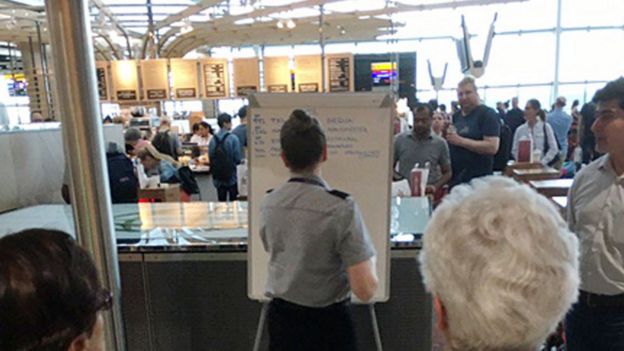
"More than conversation at the interface, it is creative assemblages like these that explore and elaborate the particular dynamic capacities that digital media afford and the ways that through them humans and machines can perform interesting new effects (...) in uniquely particular ways." Lucy Suchman (2009). Human-machine reconfigurations: plans and situated actions.
Showing posts with label reliability. Show all posts
Showing posts with label reliability. Show all posts
May 28, 2017
Apr 30, 2015
Aviation security issues with paperless option
Travelers scramble after iPad issues delay American Airlines flights, in USA Today:
Paper does not need an occasional reboot, however. (...) "He said, 'My copilot's iPad went black. Exactly 24 minutes after that, mine went black. We were informed it looks like a problem with all the iPads on 737s,' " Jacaruso, 54, recalled. (...) The crew explained that flight plans are transmitted on the iPads, which make them crucial to navigation, said McRell, 43. (...) The glitch came two weeks after the U.S. Government Accountability Office warned that i on-board wifi conceivably could be used to bring down a plane. "Modern aircraft are increasingly connected to the internet. This interconnectedness can potentially provide unauthorized remote access to aircraft avionics systems."Dezenas de voos da American Airlines em terra devido a falha nos iPad, in jornal Expresso:
Uma falha numa aplicação de iPad usada pelos pilotos da American Airlines levou a que cerca de duas dezenas de aviões da empresa não descolassem terça-feira à noite. (...) A responsável de comunicações da companhia, Andrea Huguely, indicou ao "USA Today" que, "em alguns casos, os aparelhos tiveram de regressar até à zona de entrada para acederem a uma rede de wi-fi e resolverem o incidente". "Nós pedimos desculpa aos nossos clientes pelos inconvenientes e nós conseguimos levá-los para os seus destinos passado pouco tempo", afirmou. (...) A American Airlines tornou-se em 2013 a primeira companhia a substituir os planos de voo em papel, de modo a evitar o peso extra que isso representava, passando a transmitir essa informação às tripulações através de iPad.
by
Monica Pinheiro
0
comments
 Labels:
airplanes,
aviation,
disruptions,
flight plans,
ipad,
layers of dependency,
paperless,
reliability,
security
Labels:
airplanes,
aviation,
disruptions,
flight plans,
ipad,
layers of dependency,
paperless,
reliability,
security
Dec 17, 2008
On scrapnotes and «technologizing» everything
Scrapings or information scraps are little notes that we take in a paper cloth table in a restaurant, a napkin, a post-it, the corner of a magazine or the newspaper, a notebook, but also in del.icio.us bookmarks, text files or whatever is at hand, at the moment.
Maybe the clue to understand scrapings lies not in developing new tools to add to the mash and proliferation of our bits of information, but in understanding that they are part of our own information behaviours for what works in given occasions. For me it seems more relevant to acknowledge it, and incorporate it as a practice that works for individuals, than to see it as a problem that needs a technological solution.
Scrapings are immediate. One takes note of it, with what one has at hand, and makes it immediately available to add meta data to a book we are reading, to glue at the fridge as a reminder or a grocery list that we later take with us, to note down a telephone or the name of the music passing on the radio, a research lead for later reflection, a visual signal, a temporary mark, making eliciting annotations on a paper we are reading, a drawing to complex or simple ideas.
Imagine the time (and problems) it would take for you to make a «simple» scraping in a web application (hardware + internet access + application initiation) while at the supermarket, talking with a colegue on the corridor, having a meal with friends, while driving (or stopping endlessly in IC19 ;)...
Ever notice that in a rush moment, although people have their latest technology mobile phones, in order to exchange contacts either they jot down the contact in a piece of paper, or exchange presentation cards, or they dial the number they are given to stay with that record (and confirm they have noted the number correctly) and only later (if ever) they add more information to the plenty of available labels to fill in their sophisticated «contact managers»?
Let alone the transferability and malleability of such notes, in the end is also about reliability. How many of us have lost your long time acquired contact details due to loss, robbery or malfunction of your telephones (or whatever gadget you used)? How many of us will be able to show our present pictures to our future grandchildren (even with all the available storing capacity, gadgets and backup practices)?...
Makes us think about why with so many available technologies, with all the digital facilities that we have, paper production does not seem to be slowing down and the once envisioned «digital office» couldn't look further apart as paper seems to be the most reliable medium in our PIM (personal information management) practices. Maybe paper is still our long lasting backup and not the other way around.
For a deeper knowldge about scraping, there is a lot to reflect in the Haystack Group of MIT. See also tool: List.it and protocol for conducting observations for interested users.
by
Anonymous
0
comments
 Labels:
availability,
information behaviour,
PIM,
reliability,
scraps,
tools
Labels:
availability,
information behaviour,
PIM,
reliability,
scraps,
tools
Subscribe to:
Comments (Atom)
